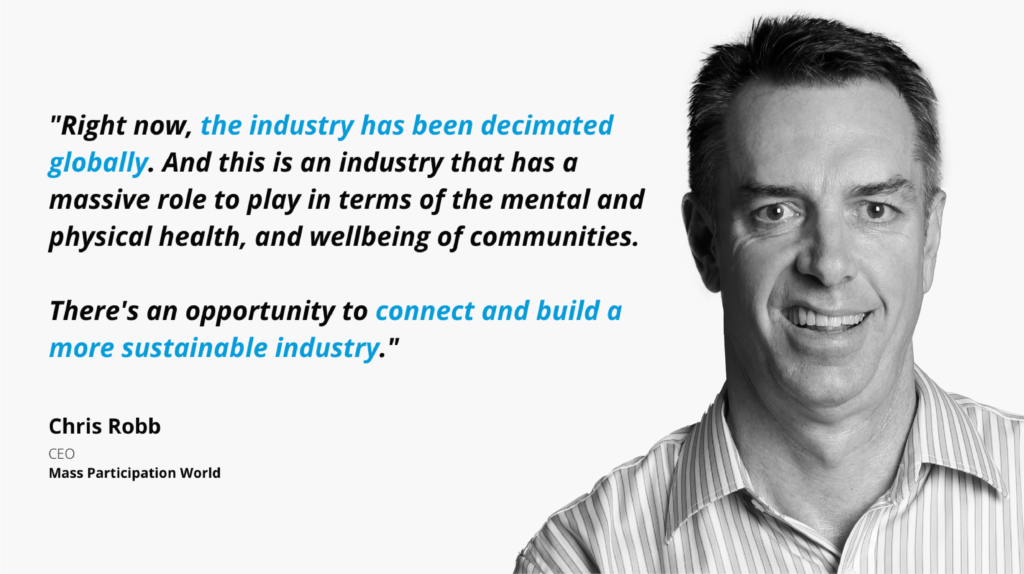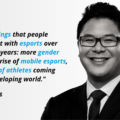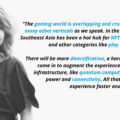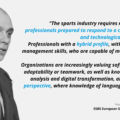31 Jan Have you met…Chris Robb? – Creating sustainable mass participation industry and community
Chris Robb is the author of the book ‘Mass Participation Sports Events’; a highly sought after International Speaker; Advisor and CEO of Mass Participation Asia.
Chris’s life reads like the pages of a novel. His amazing journey has allowed him to impact the lives of millions of people by creating and delivering mass participation sports events across three continents.
While there have been countless highlights, including working on the Sydney 2000 Olympics and recently, meeting Sir Richard Branson at his home on Necker Island, Chris came from humble beginnings, growing up poor on a farm in Zimbabwe.
It has always been Chris’s belief that our greatest opportunity to grow and learn comes from times of extreme pressure.
Along the way, he discovered that events he initially perceived as “disasters”, were in fact gifts. These significant moments taught Chris the valuable lessons he needed to be successful in business, and what he could do to help other businesses achieve success.
Question: Chris, please do a short introduction of yourself to our readers?
Answer: I’m the CEO and founder of an organization called Mass Participation World. We’re based out of Singapore but I’m lucky enough to live in Bali, which is one of the most amazing places to be during the pandemic. I grew up in Zimbabwe, and I’ve traveled all over the world. I am very fortunate to be involved in this amazing industry that creates a huge impact on the lives of millions of people across the world.
Q: How did you end up in the sports industry and what did you do before you started working here?
A: I grew up in a financially modest family on a farm in Zimbabwe, but the experiences I had were incredibly rich. I was a track runner for the 800/1500 meters. In those days, I used to run on cinder tracks, (mud base with cinders from the coal fires that were laid on top) and our track had all the cinders washed away. As a 16-year-old, I said, “why don’t I organize a fun run to raise money to resurface our track?”, and I absolutely loved doing it. Little did I know it was laying a foundation for a 35-year career.
I then moved to university in South Africa and very quickly became president of the athletics club, at Natal University in Pietermaritzburg. I was so lucky to be in this incubator helping organize a portfolio of events and some of them iconic events in the world like The Comrades Marathon. I had these incredible learning experiences. Then I went and did some travel and eventually ended up living in Australia. Within less than six months of arriving, I started a business organizing events.
My big breakthrough was when I ended up being the Road Events Supervisor for the Sydney Olympics, which was an amazing opportunity that then attracted JP Morgan as a client. We helped them launch the J.P. Morgan Corporate Challenge in Australia. They then asked me to help them take it to Asia. Some people ask how did you end up in Asia? I started the business in Singapore to deliver the inaugural J.P. Morgan Corporate Challenge after having done a few feasibility studies in other parts of Asia. And 17 years later, I’m still here.
So that took me on to building a business that ultimately had the full commercial rights for the Standard Chartered Singapore Marathon. I started a cycling event from an idea to fruition, it grew to 11 and a half thousand cyclists called Cycle Singapore, and that became a franchise with events in other countries in Asia. I sold that business to Ironman in 2016, which was about the same time when I founded Mass Participation Asia.
I’m incredibly lucky that my passion and my purpose has been my job all my working life. If I put my resume out, it’s fundamentally, one role but different company names, because it has always been me driving it.
Q: How do you identify yourself as today? Who is Chris Robb?
A: I’ve gone from organizing events and directly impacting people through the events including charities, to now being in the amazing position to help impact an industry globally. I love connecting, so to be able to connect these people globally gives me great satisfaction. The industry impacts the health and wellbeing of many millions of people. The goal and purpose for me, is helping create a more sustainable mass participation industry. I think we’re an incredible platform to be able to champion environmental, social and economic sustainability. There’s so much we can do in terms of the economic sustainability for our industry and the communities we operate in. We’ve largely been operating on a flawed business model, which has been one of the challenges of COVID.
Q: How did Mass Participation Asia become Mass Participation World?
A: Mass Participation Asia started in 2015. I had just launched my book, Mass Participation Sports Events, which is a HOW-TO put-on mass participation events, and at the time the only book of its kind in the industry. The next day we delivered the inaugural MPA conference in Singapore, which I’d put together with the idea of bringing the mass participation industry together across all its verticals, recognizing that we all have similar challenges, and similar opportunities in Asia.
We had Steve Cram, the great 800/1500-meter runner, one of the anchors of athletics for BBC, as our opening keynote speaker. Then we delivered the Singapore Marathon over the weekend. So, everything that I loved was just wrapped up in that.
In 2019, one day I was riding my bike up one of my favorite roads in Bali. The green rice fields on every side and the volcanoes in the distance. I got this calling: “Chris, it’s time to play a bigger game. You have an opportunity to make a bigger, global impact”. The next week I spent repositioning my business plan and wrote: Mass Participation World or Mass Participation Global? We ultimately settled on Mass Participation World. I just recognized that I had this ability and passion to be able to connect the industry.
The pandemic has been creating more collaboration, and certainly, where I set out in 2015, to where we are now, I could have never dreamed of having such collaboration in our industry. It’s heartening to see how the industry has come together globally.
Q: What are the key elements of Mass Participation World?
A: It’s about connecting, bringing people together, promoting collaboration, research, advocacy and education. I think that there’s a wonderful and important opportunity in our industry. Right now, the industry has been decimated globally – 70-80% gone in many countries. And this is an industry that has this massive role to play in terms of the health and wellbeing of communities, mental health, physical health, and everything else. There’s an opportunity to connect and build a more sustainable industry.
The industry has lost operators and volunteers with many decades of operational knowledge and experience.. This is being replaced in some parts now with young, tech savvy, social media savvy entrepreneurs, running potentially better business models. They’re able to monetize their communities. This new generation is coming in with a better commercial model. But if we’re not careful as an industry, and don’t equip them, in terms of operational excellence, we could have badly delivered events with safety issues. Not just around COVID, but crowd dynamics, anti-terrorism, etc. So, we must marry the two and Mass Participation World can play a role, in terms of sharing knowledge, education and other factors.
Another key element of it is research. We have been working on a Mass Participation World COVID study. It’s been running for over a year. The numbers that we put out recently state that over 7.2 million participants in events in 36 countries had only five reported COVID cases.
Another piece that we’re working is called the Mass Participation Ripple Effect, a study to understand the impact that one person participating in a mass participation event has on health and wellbeing of a community. This study is working with a globally recognized neuroscience and behavioral economics expert from Australia. He initially said, “Chris, I think we’ll be able to prove that the economic impact goes 10 people deep”. After initial desktop research and the publication of a white paper we believe that it may go 200 people wide because it’s not linear, it’s compounding. The impact of these events and sport on communities is enormous. We’re also working on a global initiative, which will happen in April, and annual Global Mass Participation Week, to shine the light on the mass participation industry under a hashtag of #togetherwemove.

Q: You also give some visibility and importance to the technological innovation at your annual conference. The GSIC has been collaborating with you on that for the past three years. How important to you is the innovation and digital transformation in the sports industry?
A: It’s critical. It’s been highlighted during the pandemic. There’s been amazing innovations. We’ve loved the partnership with GSIC and this opportunity to showcase innovation within the industry. This year, we had eight different innovations ranging from timing innovation, to building communities and charity giving in a very quick and simple way. Our industry is joined at the hip to charities. We’ve raised hundreds of millions of dollars across the globe for charities, and a fantastic initiative around sustainability, a tool, that’s been created by the Council for Responsible Sport in the US. My big hope is that Mass Participation World ultimately becomes a platform for not only showcasing technology, but potentially matching with investors to see that this is a piece of innovation that came together at Mass Participation World that impacted the mass participation industry and other industries within and beyond the sport sector globally.
Q: The last two years were quite difficult for the events industry. What have you learned from the pandemic? And how did you approach it?
A: The biggest learning is the power of collaboration. We’ve seen an industry quite siloed and secretive, in some cases put their full operational plans on a website to say, “anybody that can use this to help them get back to live events for the betterment of the industry, is welcome”. Another key thing is technology and innovation that we’ve spoken about. I’m also seeing a purpose driven industry. People are looking to be working in organizations that drive purpose, but brands are also really interested in being associated with events that can showcase their purpose.
Q: What do you think will be the main challenges for the events industry this year?
A: The biggest challenge is getting back to live events. We’re at a disparate stage across the world, in Asia, Africa and Latin America only very few events are coming back but in Europe and America things returned with a hugely congested calendar last year and are looking positive for the northern spring season
COVID has highlighted the fact that we needed to advance and evolve. I don’t think we still necessarily have the answers to that. I still see many events that have come back with a similar business model, not prepared to increase their entry fees, not identifying new revenue streams against the backdrop of input costs that have increased from 10 to 30%, with the challenges of supply chain, the great resignation. These kinds of challenges present opportunities to streamline and grow and build a better business model. Innovation and technology will be key.
I’m also still not convinced that as an industry, we’re telling the right story. In many parts, we’re still selling events, rather than talking about communities, health and wellbeing. We have this amazing opportunity to build a community that we can engage with on a year-round basis. This potentially creates opportunities to monetize potential virtual events, that then help peaking the next in person events.
Q: What was the last edition of Mass Participation World like?
A: I’m really delighted and would be even more delighted if it was an in-person event in Singapore again, hopefully that’s for 2022. I always try to look beyond the industry. What can mass participation learn from other verticals of sport? And what can we learn from other industries? For me the three big takeaways are the problems that mass participation can help sell on a global basis. We had Fiona Berwick, from ASICs, the head of global marketing communications. She spoke about the next global pandemic, being mental health issues. And there is absolutely no doubt in my mind that mass participation as an industry and sport in general are so well positioned to be able to help with mental health.
The other key thing which came out of it, was the importance of purpose. The fact that mass participation events are so purpose led, and many employees are looking to be in purpose led organizations whilst brands are looking to align with purpose-driven events which presents incredible opportunities for the mass participation industry.
Finally, the importance of community – bringing people together and building a community from a government perspective. This is a problem that governments are dealing with. It’s possibly a problem that brands are dealing with as well. Mass Participation and sport in general has this incredible role to play in humanity, health and wellbeing of humanity.
I think that the industry is going to explode. It might take two years, it might take three years, it might take five years, but we have a vitally important role to play in society.







